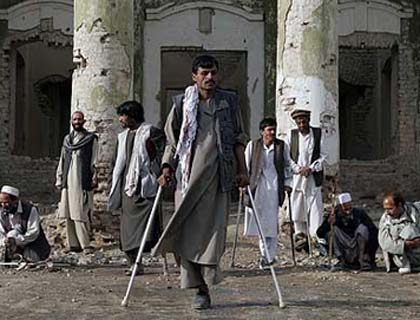Last year, an interview with a journalist, Sirajuddin Haqqani claimed that some people within the government department in Afghanistan share political and military information with his group. The recent debates on the Taliban infiltration and their secret networks within the Afghan Army, police and intelligence infrastructures have diverted the attention of US, UK and NATO military commands towards the changing attitude of the government and the killing of their soldiers by their partners.
In February 2012, a senior Afghan military official disclosed that his country wants to act quickly to clear the barracks of security forces from the Taliban sympathizers. However, in my previous articles, what I had warned about increasing distances between NATO and Afghan forces became a reality.
In February 2012, abhorrence against the US forces spread across the country after the desecration of the Holy Quran in the US Bargam base. In reprisal, an Afghan intelligence man killed U.S lieutenant colonel and a major in their office inside the Interior Ministry while in March 2012; Taliban brutally killed six British soldiers in Kandahar.
This and other misgivings further caused mistrust between Afghanistan and US military command. In March 2012, an Afghan soldier and a teacher killed two NATO soldiers in Kandahar. The ISAF press release stated that two individuals turned their weapons indiscriminately against their force killing two soldiers.
Having realized the sensitivity of the situation, Pentagon and Obama administration apologized and complained that Afghan army has failed in protecting American soldiers in Afghanistan. President Obama was in trouble on this issue while French President Nicolas SarKozi accepted his country defeat by announcing the withdrawal of military forces from Afghanistan by the end of 2013.
The story became more interested when an Afghan military commander said that the large size of the Afghan army caused Taliban infiltration. Military experts viewed this statement as new policy shift of the Afghan government against ethnic officers in ANA. Last month, Afghan Defense Ministry had warned all officers within the army and police forces that if they did not shift their families back from Pakistan to Afghanistan, they might lose their jobs.
A report claimed that Afghans living in Pakistan are being brain-washed by the country secret agency ISI. However, KHAD, NDS and RAMA then proposed a plan of typing and recording telephone calls of the Afghan military officers and monitoring their movements and personal relations so as to expose the links of ISI links within the Afghan army ranks and file.
But main question here is who will monitor the illegal movements, corruption and underground activities of the Afghan groups as they have already established secret links with the intelligence communities across the borders. Afghan intelligence chief must also understand that his spy agency might be facing the same problem of infiltration. CIA and other agencies have strong representation there while some other elements within the agency infrastructure might be playing in opposite directions.
How embarrassing is when intelligence Chief cleared himself by saying that his agency arrested government official in connection with spying for neighboring states. In my understanding, this is not the solution to put all filth on the shoulders of neighboring state and blame them for the whole misadventure of Afghanistan.
Moreover, European and other western intelligence agencies have long criticized KHAD, WAD and NDS for their non-professional way of operations. The killing of six British soldiers by the Taliban insurgents further widened the gap of mistrust the Taliban and NATO alliance engaged in talks with Taliban since a year in and outside Afghanistan.
These killings enraged the entire population in the UK. In a statement Ministry of Defense said six soldiers were on a security patrol in a warrior armored fighting vehicle when it was caught in an explosion in Kanahar province.
Defense Secretary Philip Hammond said the timetable for withdrawal remained on track despite this attack. A recent Review Draft (September 2010) of the Centre for Strategic Studies in Washington has revealed that failure to try to develop a strong Afghan army caused more trouble when the Afghan soldiers started attacking their foreign partners in the battlefield. According to the Review Draft assessment, "... [The] breakdown of the ANA makes a deeper problem. Promotions within the ANA also are often based upon patronage, money, or personal loyalty rather than upon ability.
Entrenched and powerful patronage networks dominate the promotion system in the ANA and have created large blocks of officers whose loyalty to the central government is dubious at best." The story of a strong Afghan army has become more complicated when various sections of civil society expressed apprehensions about the vulnerability of the security forces after the withdrawal of foreign forces from Afghanistan in the end of 2014.
The recent US-Taliban negotiations in and outside Afghanistan further downgraded the moral of ANA officers that their future is at spike. Failure to make the ANA a reliable and trusted partner of NATO and ISAF created misunderstandings not only between the US and Afghanistan but within the ISAF high command as well.
Afghans complain that NATO and the US are struggling to establish their own rogue private militias instead of strengthening the Afghan National Security Forces, while NATO and U.S complain about the Taliban infiltration within the ANA.
Consequently, the process of the establishment of a strong Afghan National Security Force remained in procrastination. Different affiliations, inclinations and associations within the Afghan security forces and intelligence infrastructure, created may suspicions about their loyalties to the state and government. Now as the story of building a strong Afghan Army has become a joke, Afghan Air Force is not allowed to fly in the skies of its own country. The situation gets horrifying as there are reports about the deep sympathy of the Afghan soldiers and officers with Taliban militant groups.

